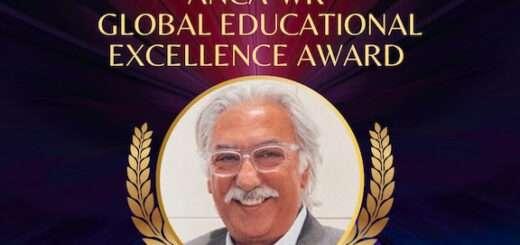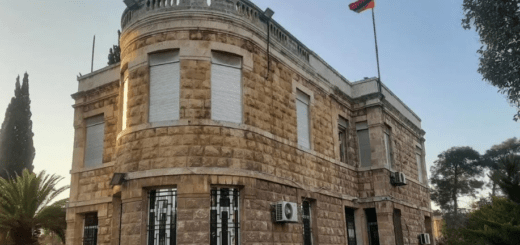Australia’s silence on Armenian Genocide reveals shameful political cowardice

Despite eyewitness accounts from Anzacs and repeated calls from MPs, successive governments have refused to recognize the Armenian genocide — a silence that speaks volumes, writes Simon Tatz.
AUSTRALIAN GOVERNMENTS continue to deny formal recognition of the Armenian genocide, notwithstanding the direct involvement of the Anzacs and robust calls from senior politicians.
The Armenian Genocide (1915-1917) was the systematic mass extermination and deportation of an estimated 1,500,000 Armenians by the Ottoman Empire, commonly called the Young Turks.
From 1913 to 1923, the Ottoman Christian Genocide (also called the Assyrian and Greek Genocide) occurred. An estimated 250,000 to 500,000 Assyrians (Syriac-speaking Christians, predominantly members of the Assyrian Church of the East, Syriac Orthodox Church and Chaldean Catholic Church) were slaughtered, and an estimated 300,000 Pontic and Anatolian Greeks were killed.
Recognizing the Ottoman-era genocides is deeply entwined with the Holocaust.
German Chancellor Hitler, on the eve of invading Poland and unleashing the Holocaust, told his military commanders:
“…I have placed my death-head formation in readiness – for the present only in the East – with orders to them to send to death mercilessly and without compassion, men, women and children of Polish derivation and language. Who, after all, speaks today of the annihilation of the Armenians?”
Thirty countries speak today for the Armenians by recognizing the genocide, but not Australia. We don’t stand alongside France, Germany, Italy, Sweden, the USA or the European Parliament. Türkiye (Turkey) (the perpetrator state), Azerbaijan, Pakistan, Georgia and Israel refuse to recognize the word “genocide”.
Australia’s position is apparently “clear” — we ask the perpetrators and victims to “resolve” this “sensitive issue” through dialogue.
As genocide experts are justifiably scrutinizing the actions of the Netanyahu Government, we should also consider whether Australia’s refusal to recognize the Armenian genocide is because of the lobbying power of the government of Turkey.
In 2013, ABC’s 7.30 program aired a story exposing a Turkish Government threat to ban members of the NSW Parliament from attending the centenary commemorations at Gallipoli, following official recognition of the Armenian genocide by the NSW Parliament.
NSW Christian MP Fred Nile was an influential force behind the motions to recognize the Assyrian and Greek genocides, reaffirming a 1998 NSW Legislative Council motion recognizing the Armenian genocide.
Professor Colin Tatz, founder of the Center for Comparative Genocide Studies and world-renowned genocide scholar, told the ABC:
“There is categorical evidence that what happened between 1915 and 1922 was genocide of the Armenians, the Pontian Greeks and the Assyrian communities to the extent of roughly half of their population.”
This threat by the Turkish Government carried serious consequences. Gallipoli holds a deep significance in Australian life; the pilgrimage to the Gallipoli Peninsula and Lone Pine Cemetery is embedded in our national identity.
A lesser-known aspect of the failed Gallipoli campaign against the Ottoman Turks is that Anzac P.O.W.s observed and recorded acts of genocide, including Captain Sir Thomas White, later Member for Balaclava and Minister for Trade and Customs.
As the Armenian National Committee of Australia explains:
‘Shortly after the Gallipoli campaign, Australian soldiers came into contact with the genocides of the Armenian, Greeks and Assyrians. Over 300 ANZACs were held as prisoners of war by the Ottoman forces. These ANZACs recorded their experiences in detailed diaries and memoirs with vivid accounts of the genocide. Many of these accounts are now stored in the archives of the Australian War Memorial.’
For reasons only the War Memorial can justify, there are no gallery displays or dedicated exhibition space about the Armenian genocide. Writing for The Guardian, author Paul Daley noted that there had never been any official mention in Anzac commemorations ‘of Australia’s witness to the Armenian genocide’.
Australia not only doesn’t recognize the fate of the Armenian people, but we seemingly refuse to mention the Anzac involvement in the ever-expanding War Memorial publicly.
One explanation is that the Turkish Government is a powerful lobbyist and a vehement genocide denier.
Back in 2013, when Australia was planning for the 100th anniversary commemorations at Gallipoli, the Turkish Consul General in Australia, Gulseren Celik, told the ABC that she was ‘confident the Federal Parliament has no intention of following’ the “outrageous”
The Consul General said:
“…Armenians have never been able to take [their claim of genocide] to the international courts because there is no documentation, not a shred of evidence. Even the figures they give are not true.”
The Turkish Foreign Minister issued a statement declaring that no persons who damage the spirit of Gallipoli would be allowed into Turkey, including members of parliament. He confirmed this could include then NSW Premier Barry O’Farrell.
More troubling, as the ABC reported, Turkish officials also claimed our Anzac P.O.W.s had fabricated their eyewitness accounts. These expected attacks on the character and actions of the Anzacs were not rebutted or defended.
Australian governments wouldn’t use the word “genocide”; instead, they diminish it to “suffering” of Armenian people.
Former Treasurer Joe Hockey, who is of Armenian‑Palestinian heritage, used an Adjournment Speech (20 October 2008) to publicly call on the Government to recognize the Armenian Genocide.
Hockey’s speech was powerful:
The intention of the Ottomans was the complete obliteration of not only the Armenian nation but any memory of the Armenian people as well.
…many countries have officially recognized the Armenian genocide. As yet, Australia has not done the same. This weighs heavily on me, particularly as my own grandfather was himself a survivor of the genocide. He never knew the fate of his siblings and his friends as they were presumably led to their deaths.
Similarly, this lack of recognition weighed heavily on the hearts of Armenian-Australians… I urge this parliament to recognize the Armenian genocide for what it was — not alleged, not supposed and not so-called. It was the intentional attempted obliteration of an entire people.
To refuse to acknowledge this genocide is to ensure that future Hitlers can capitalize on the world’s reticence in taking a stand.
In 2011, Malcolm Turnbull and six other MPs declared the Armenian, Greek and Assyrian Genocides a historical reality and called for formal recognition by the Australian Government.
Liberal MP Tim Wilson told Parliament:
“I remain fundamentally disappointed that our national parliament doesn’t fully acknowledge the horror and tragedy of the genocide against the Armenians. I would hope that we would acknowledge the genocide against all people where they occur.”
Shadow Minister Julian Leeser also called for Government recognition of the genocides:
“The death of 1.5 million Armenians has been dismissively referred to as ‘victims of war’, ‘civilian casualties’ or ‘collateral damage’. Those very euphemisms were the same used by Nazi perpetrators of the Holocaust.”
A motion moved on 25 June 2018 by Trent Zimmerman (Liberal), seconded by Joel Fitzgibbon (Labor) and John Alexander (Liberal), with support from Labor’s Chris Bowen and Anne Aly, was never put to a vote as there was no government support.
At a Senate estimates hearing Senator Rex Patrick asked the Department of Foreign Affairs (1 May 2018):
“Why has the Federal Government continued to deny recognition of the Armenian Genocide?”
The official response claimed that there are deeply held views in Turkey and Armenia, and other affected communities, including in Australia, in relation to these events. The Government respects these views and has a long-standing and clear position. The Government “does not intervene in this painful historic debate” and believes “that dialogue between the communities and governments directly involved is the best way forward to resolve such a sensitive issue”.
It’s worth repeating this — the Australian Government “does not intervene in this painful historic debate”. Painful is their word, not genocide.
Every attempt by individual MPs to recognize the genocide was either voted down or allowed to lapse without government support. No Australian government has ever explained why they won’t recognize the fate of Armenians, and the concurrent genocides against the Assyrians, Pontic and Anatolian Greeks.









